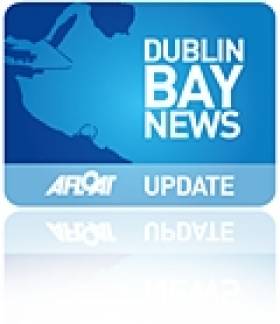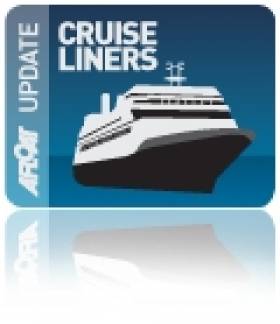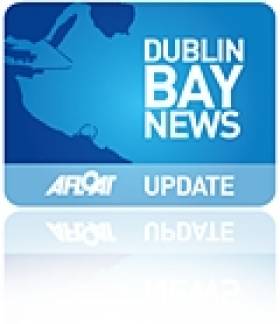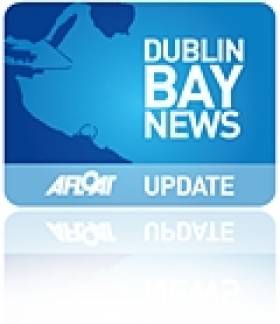Displaying items by tag: Ciaran Cuffe
A Dublin MEP says the intended site of the now-scrapped inner city white-water rafting proposal would be ideal for a heated outdoor pool.
An online petition by two doctors backing a proposal for a public lido at the George’s Dock site previous earmarked for an ‘elite’ kayak slalom course has garnered more than 4,000 signatures.
And writing in The Irish Times this week, Ciaran Cuffe of the Green Party suggests that Dublin could look to the likes of the Piscine de Wacken municipal swimming complex in Strasbourg for inspiration.
“The main attraction is an outdoor heated 50m pool, and it also features a shallow children’s pool for families, and an area where older people take aqua-aerobics classes and others practise synchronised swimming,” he says.
“All these facilities are open all year, even when temperatures fall below zero and steam rises off the water.”
He adds: “Figures supplied to me by the city [of Strasbourg] indicate that it costs €3 million annually to run, of which €1 million is recouped from admission charges.
“The €5 entry fee is a fraction of the €50 that might have been charged for entry to the white-water rafting proposal.”
Cuffe also posits that such a pool at George’s Dock could be heated by waste heat from the Ringsend waste-to-energy plant, as its pipes have already been laid along the north quays.
And he argues that in contrast to the poor reception that met the council’s rafting course plans, Dublin is crying out for a city-owned and operated outdoor pool, with demand exceeding supply across the capital’s dwindling number of public pools — not to mention the lack of access to the Clontarf baths due to insurance issues.
The Irish Times has more on the story HERE.
Green Party Speaks Out for Small Boat Owners in Dun Laoghaire
Ciaran Cuffe TD of the Green Party has spoken out in support of small boat owners in a submission to the Dún Laoghaire Harbour Masterplan. Cuffe, a candidate in the General Election, says the prioritisation of space within the harbour for surface car parking and marshalling yards for ferry services has reduced the space available for small boat owners. Cuffe says the masterplan should specifically enhance facilities and storage space for small boat owners, such as the Coal Harbour Users Group (CHUG) and local yacht and water sports clubs. He also says consideration should be given to the development of workshops to promote traditional boat building and small craftrepair and restoration.
The full submission from Ciaran Cuffe is below:
"I welcome the preparation by the Dún Laoghaire Harbour of a masterplan for the harbour area. Dún Laoghaire harbour is a major recreational and amenity resource for the locality andwider Dún Laoghaire area and a long-term strategic vision underpinned by a plan-ledimplementation framework is vital in order to secure the harbour's future for the benefit of both the Harbour Company and the local community.
Maintaining a ferry link to the UK
I welcome the proposal to redefine Dún Laoghaire Harbour as a leisure harbour. However, Ibelieve that future opportunities to keep a ferry link with the UK should not be lost. As we have seen during recent incidents when airplanes were grounded, travelling by ferry is still aviable means of travel and may become increasingly so in the future. A seasonally ferryduring the summer months could be considered and the infrastructure needed for a ferryservice should be maintained. The Harbour Company should work to secure INTERREG funding to provide better linked-in ferry and train services between Ireland and the UK.
Cruise Ships & Tourist Development
There is considerable scope to attract the cruise liner market to Dún Laoghaire. Dún Laoghaire is a fantastic harbour location with a unique built and natural heritage. Its location immediately adjacent to the Dún Laoghaire DART station makes it an ideal gateway locationfor tourists to explore Dublin City and hinterland. We have seen the positive impact of large cruise liners docking at Dublin Port with thousands of visitors disembarking, visiting Dublin's tourist attractions and spending money in local businesses. Dún Laoghaire Harbours offers a much more pleasant and suitable docking location for cruiseships and there is a major opportunity to exploit this economic potential for the benefit of the wider locality. Any physical works required to facilitate the mooring of large cruise liners in Dún Laoghaire should be carefully designed so as to avoid any adverse impact on local builtand natural heritage, including the Dublin Bay Special Area of Conservation.
Built Heritage
The unique physical fabric and built heritage Dún Laoghaire Harbour is an important assetand must be conserved and enhanced. In particular, the historic Carlisle Pier now has thepotential to provide a high quality outdoor public amenity space. I understand that elements of the 1890's Victorian railway building have been retained and I believe that these elements should be reconstituted as part of multi-functional covered space to, for example, host an ice-rink in winter, the Festival of World Cultures in summer and occasional outdoor events andmarkets.
Open Space & Public Accessibility
In recent years significant areas of the Harbour Company land was converted to revenuegenerating surface car parking. This has created a car dominated environment and adisconnect between the harbour area and Dún Laoghaire town. The long-term future of theharbour is much better served by opening up the harbour area to pedestrians and cyclists, enhancing accessibility for the general public, improve directional signage, reducing surfacecar parking and delivering more green spaces. In order to achieve this, the Masterplan shouldinclude a detailed design framework for the public realm including further measures to removethe barriers to accessibility due to the rail line.
Views
The sensitive built, natural and visual environment of the harbour requires a very carefulapproach to any future infill development. Particularly, infill development should be in keepingwith the existing building heights of the town to protect the harbour setting and views fromDún Laoghaire to Dublin Bay and Howth Head and sensitively designed to conserve thecharacter of local built heritage and the numerous important protected structures.
Small Boat Owners
The prioritisation of space within the harbour for surface car parking and marshalling yards for ferry services has reduced the space available for small boat owners. The masterplan should specifically enhance facilities and storage space for small boat owners, such as the CoalHarbour Users Group (CHUG) and local yacht and water sports clubs. Consideration should be given to the development of workshops to promote traditional boat building and small craftrepair and restoration.
Conclusion
Dún Laoghaire is extremely fortunate to have a unique historic harbour resource, which is a central part of the local identity and a much loved and valued social, recreational, and amenity resource. However, the future economic viability of the harbour is dependent on creating appropriate synergies with the wider economy of Dún Laoghaire. The imaginative redevelopment of the harbour can contribute significantly to the local economy, particularly inthe development of heritage and tourism initiatives, The Masterplan must focus on how the future development of the harbour can contribute to cultivating these synergies in a manner, which is economically, socially and environmentally sustainable."
New Business Could Float in on the Tide
Local TD and Minister of Sport Mary Hanafin has given her support to Dun Laoghaire Harbour Company's initiative to promote the town as a cruise tourism destination on Dublin Bay. Writing in her latest newsletter to constituents this month, the Minister says she will do everything within her remit to support the bid.
Harbour Company issue Carlisle Pier Statement
The Dun Laoghaire Harbour Company has issued a brief statement regarding the decision of An Bord Pleanala on the demolition of structures on the Carlisle Pier last September. Afloat.ie reported that Ciaran Cuffe has called for the old Victorian structure on the pier to be rebuilt.
The Harbour Company published a brief statement on its website in response:
"The Dun Laoghaire Harbour Company is studying the initial report of An Bord Pleanala regarding the Carlisle Pier, and notes that it is the opinion of the Bord that the works, which occurred in early September 2009, did not involve Protected Structures or interfere with the setting of any Protected Structures. The Bord was of the view that the works required permission, and the structures constituted "Business Premises". The Harbour Company, in the light of the long disuse of the Pier, will study the report of the Bord's Inspector in detail and will then be in a position to make further comment.
Green TD wants Carlisle Pier Rebuilt
Green TD Ciaran Cuffe wants the Dun Laoghaire Harbour Company to rebuild the Victorian Railway building on Dun Laoghaire's Carlisle Pier. The structures on the Carlisle Pier were demolished in September of last year, and Deputy Cuffe reported the demolition to An Bord Pleanála in October, claiming that the demolition breached planning regulations and should have gone for approval. The Board ruled that the demolition of Carlisle Pier did not constitute 'exempted development' and therefore required planning permission. Cuffe has requested a meeting with the harbour company as soon as possible.
A statement on his website says:
“I welcome An Board Pleanála decision which holds that the Harbour Company were not authorised to demolish the pier in the manner in which they did.
“Few would shed any tears for the removal of the newer 1960s building on the pier but beneath it was an old Victorian Railway building that was a part of Dún Laoghaire's heritage.
“I think independent semi state companies should adhere to the highest planning standards. I am disappointed that the Dún Laoghaire Harbour Company demolished the building despite my writing to them stating that the demolition was illegal. They wiped away more than a century of our history and heritage, without asking the people of Dún Laoghaire for their opinion.
“I understand that much of the original building has been salvaged by the Dún Laoghaire Harbour Company. I hope that they will now restore the nineteenth century Railway Building that stood intact on the site concealed underneath the twentieth century building.”

































































